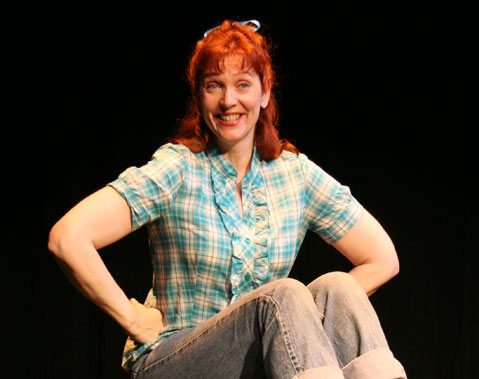Spit Like a Big Girl at the Rubicon
Clarinda Ross Opens One-Woman Show, Spit Like a Big Girl

Even in these recessionary times, America is suffering no shortage of autobiographical monologues, so for one to stand out, it helps greatly to have an attention-grabbing title. Clarinda Ross has that priceless advantage, and for that she can thank her husband.
The epiphany came 12 years ago, when Ross was performing her work-in-progress at a small theater in Los Angeles. At the time, it had a long and rather cumbersome title.
Then one day her spouse, veteran character actor Googy Gress, overheard a conversation between the actress and her mentally retarded daughter as they stood at the bathroom sink. Ross was attempting to coax eight-year-old Clara into properly completing the process of brushing her teeth.
“He heard me tell her, ‘Spit, baby! Spit like a big girl!'” Ross recalled. “He told me, ‘That has to be the name of your show!'”
And so, after years of rewriting and refining, Spit Like a Big Girl will have its official world premiere on Saturday night at the Rubicon Theatre. Given the richness of the subject matter (the shifting roles of parents and children), the pedigree of the director (the consistently excellent Jenny Sullivan), and Ross’s track record at Rubicon (where she walked away with the uneven 2007 production Bad Apples), it is fair to say the show arrives with great expectations.
“The theme of the show is growing up and letting go,” said Ross, who has never lost the accent she acquired growing up in Boone, North Carolina. The two-act work jumps around in time to tell two stories: The bond between Ross and her daughter, who is now 20 and living in a group home; and the relationship between the actress and her father, who died suddenly at age 56. She was in her mid twenties.
“I had Clara and my Daddy died within 30 days of each other,” Ross said. “Stuff happens to everybody, but it happened to me at a little bit younger age than it happens to most people, and I’ve been able to put it in my work.”
Ross’s father was a history professor at Appalachian State University, where he founded the Center for Appalachian Studies. Her mother, who Ross refers to as “a renowned storyteller,” still teaches at the school. Ross recalls many noted authors visiting their home, including Alex Haley of Roots fame. “My Dad blended in amazingly well with both the intelligentsia and the people at the gas station,” she said.
She had moved away to Atlanta and was pursuing a successful acting career when he had his fatal, middle-of-the-night heart attack. “I was searching for his will when I found his journals, which were stored in my old room for some reason,” she said. “He kept them for 20 years, but nobody knew about it. They were a great posthumous gift to me.”
At the time, she had already written and performed a one-woman show, From My Grandmother’s Grandmother Unto Me, which was filmed and shown on a number of PBS stations. “I got an NEA Individual Artist Grant to do it-back when they had money,” she said. “I was in the grant pool with [photographer Andres Serrano, who created the controversial photograph ‘Piss Christ.’ The program ended the next year.”
Ross quickly realized there was a show in the journals, but it took her quite a while to find it. Throughout the next two decades, she moved to Los Angeles, married Gress, had two more children, and acted in the occasional movie or play. She also kept returning to the show, trying out new material at workshops, as well as in less formal settings.
“If I was doing a play, I’d go to the stage manager and say, ‘I’m working on this piece. Please go out there and ask if anybody wants to stay after the show,'” she said. “Some people always did! I’d give them a break and then do 10 minutes.”
For the Rubicon production, Ross has written a lot of new material, under the guidance of Sullivan and dramaturge Bill Keeler. “I feel like I’ve died and gone to heaven,” she said. “Jenny and I have an amazing shorthand. She’s helping me to connect the dots, and to show how living with my parents gave me the patience and compassion and tenacity I needed to live a life of care. I was my Daddy’s girl,” she said. “Then I had this girl, and I had to become a bigger person to care for her. Then, at the end of all this care, you have to let go. Since I did the last workshop production, Clara has learned how to dress herself and wash herself and brush her teeth. And spit.”
4•1•1
Spit Like a Big Girl opens at Ventura’s Rubicon Theatre on Saturday, May 16, at 7 p.m. Previews on Thursday, May 14, and Friday, May 15, are at 8 p.m. The show then runs Wednesday through Sunday until June 7. For tickets and information call 667-2900 or visit rubicontheatre.org.



